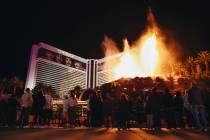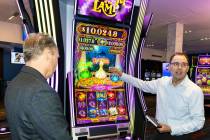Casino industry regulation changes ‘needed to happen’
The 2015 Nevada Legislature adjourned on June 1, but the session never ended for state gaming regulators.
Six bills passed by lawmakers and signed by the governor brought aspects of Nevada's gaming industry into the 21st century. But the legislation also required months of debate to change existing gaming regulations and write new laws.
"These were changes that needed to happen," said Gaming Control Board Chairman A.G. Burnett. "We've given the industry some good tools to work with."
Lawmakers and regulators addressed skill-based slot machines, increased sports book operations, specified the definition of illegal bookmaking, characterized equipment used to manage gaming, changed the effect of the state's live entertainment tax on casinos, and added rules requiring resorts to more stringently monitor their nightclub venues.
Also approved was expanding the definition of organizations qualified to hold charitable lotteries. The legislation was drafted by a gaming law class from the University of Nevada, Las Vegas Boyd School of Law and was folded into Senate Bill 38, which covered the nightclub requirements and the associated gaming equipment matter.
Initially, Burnett didn't believe the 120-day legislative session would be "gaming-concentrated."
"However, we recognized some changes needed to take place," he said.
Burnett has been with the agency or the attorney general's gaming division since 1998. He was appointed chairman in 2013 after two years as a board member. He said the regulation re-writes were the most comprehensive he's experienced during his tenure in gaming.
Others involved in the process had similar sentiments.
Senate Judiciary Committee Chairman Greg Brower, R-Reno, who conducted hearings on all the legislation, said three bills, Senate Bill 9, Senate Bill 443 and Senate Bill 445, "were probably the most important bills passed."
Brower, an attorney with Snell & Wilmer, said the development of skill-based slot machines (SB9) was viewed as a tonic to revitalize the manufacturing sector and a way for casinos to attract a younger gambling demographic. SB443 and SB445, which covered the race and sports book industry, were are tools to increase the state's wagering numbers.
"All three bills were intended allow Nevada to remain in the vanguard of gaming jurisdictions in terms of adopting legal and regulatory changes to adapt to evolving industry realities," Brower said.
CG Technology General Counsel Quinton Singleton credited gaming regulators with helping move the bills through the legislature. The company backed the sports wagering changes. One measure now allows Nevada companies to manage sport books outside the state, if federal sports wagering laws are ever loosened.
"The key component of this law is to drive investment in technology, education and race and sports to further Nevada as the hub for the race and sports betting industry," Singleton said.
The other bill permits race and sports wagering to take place through business entities, such as a corporation or a limited liability company. Framework was established for mutual funds to provide alternative investment opportunities focused on race and sports betting.
"Our expectation is that race and sports betting mutual funds become a significant economic driver to Nevada's race and sports book industry and to the state," Singleton said.
Nevada Resort Association President Virginia Valentine said the group supported the regulation changes, offering input during several workshops.
Multiple revisions to the live entertainment tax, which converted the collection to one based on admissions rather than taxes on food, beverage and merchandise, simplified the process, she said.
"Casinos weren't looking to pay less," Valentine said. "This was revenue neutral. We wanted something that was clear and simple."
The Nevada Gaming Commission last week approved changes on how gaming companies monitor their nightclubs. The regulation was the result of disciplinary complaints that levied six-figure and seven-figure fines on casino operators over the past few years.
Among the changes, casinos will have to designate an employee to oversee and monitor the nightclubs and that person will have to be licensed under state gaming regulations as a key employee. Also, promoters and independent hosts for the nightclubs will have to file written agreements and register with the Gaming Control Board.
"Since there wasn't the creation of the nightclub regulatory body, then this goes to one of our core beliefs in protecting the industry," Burnett said.
The regulation changes aren't done. The Brownstein Hyatt Farber Schreck law firm has proposed a new regulation that would create licensing framework for private investment companies that would help boost interest from private equity funds and financial institutions, but would eliminate the publicly traded entity requirement that promotes financial reporting transparency.
Howard Stutz's Inside Gaming column appears Wednesdays and Sundays. He can be reached at hstutz@reviewjournal.com or 702-477-3871. Find on Twitter: @howardstutz




























